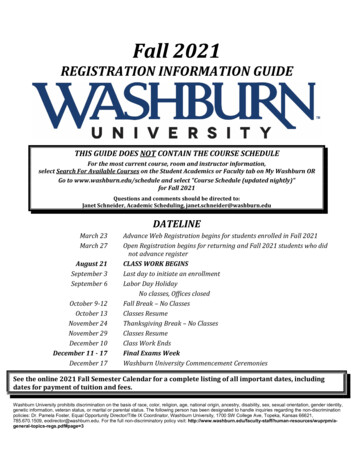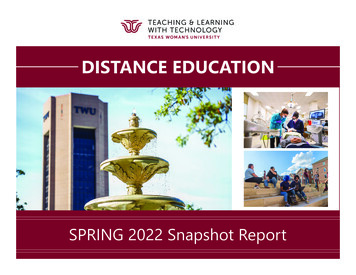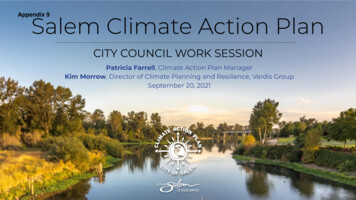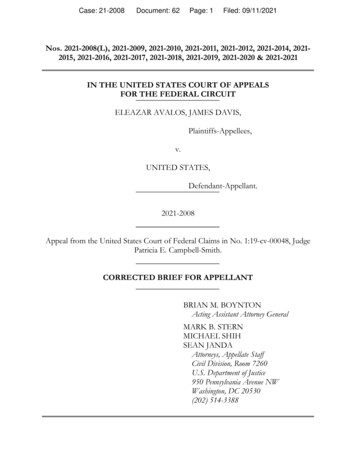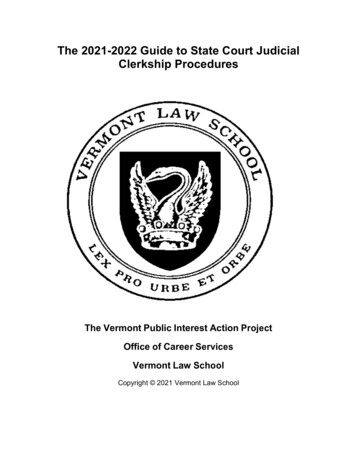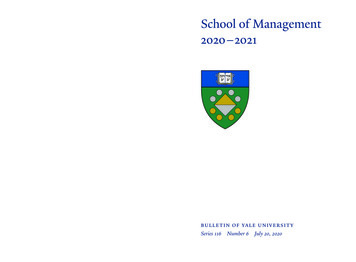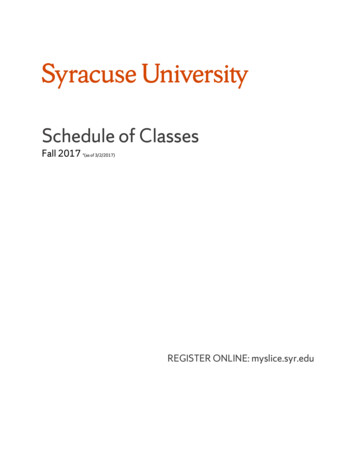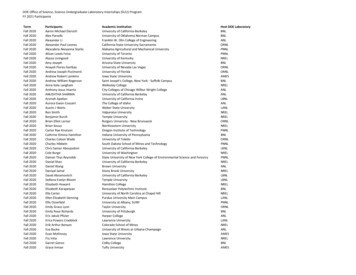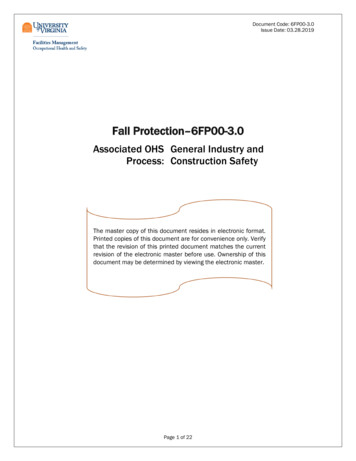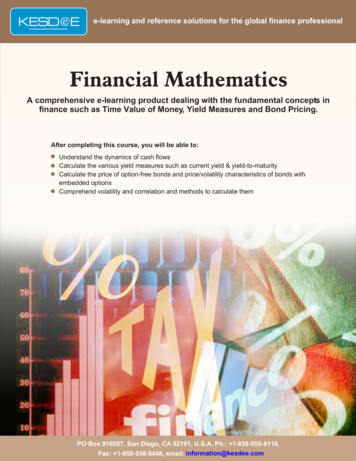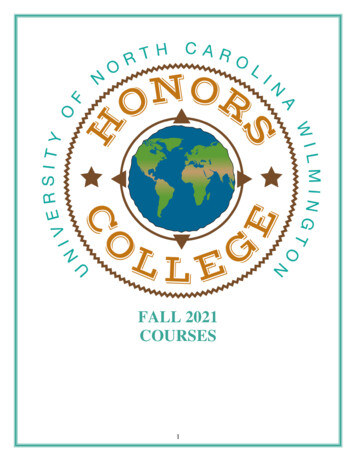
Transcription
FALL 2021COURSES1
Honors StaffFall 2021Dr. Shawn Bingham, Directorbinghams@uncw.eduDr. Eva Mehl, Associate Directormehle@uncw.eduDr. Nathan Grove, Assistant Director of CSURFgroven@uncw.eduMs. Peggy Styes, Program Managerstyesp@uncw.eduMs. Morgan Rilling Alexander, Office Managerrillingm@uncw.eduMs. Nicole Kroushl, Student Services Specialistkroushln@uncw.eduPhone: (910) 962-3408Fax: (910) 962-70202Email: honors@uncw.edu
Honors 110Course and Call #HON 110-300Drug Development andClinical Trials: the Pursuit ofNew Medication#10481HON 110-301Science in the News:Reading, Understanding, andCommunicating NewDiscoveries#10499HON 110-302English as a Global Language#10506HON 110-303Towards and Understandingof the First Amendment in aDigital Age#10539HON 110-304Diversity in Science: DrivingExcellence in Creativity andInnovation#10551HON 110-305Living your Best LifeThrough PsychologicalResearch#10555HON 110-306What is Science?#10558HON 110-307Exploration of CreativeWriting#10562HON 110-308Hope, Resilience, andWellbeing (optional trip toLondon, UK in December)#10567Date, Time, and ModalityTR12:30-1:45 pmF2FInstructorJennifer McCallTR12:30-1:45 pmF2FEvan Scott-PollockTR12:30-1:45 pmF2FTR12:30-1:45 pmF2FNicholas CrawfordTR12:30-1:45 pmF2FAna Barrios SosaTR12:30-1:45 pmF2FErica NolesTR12:30-1:45 pmF2FTR12:30-1:45 pmF2FNathaniel GroveTR12:30-1:45 pmF2F3Felix BrooksPatricia BjorklundKristin Bolton
HON 110-309Law, Citizenship, and theCity#10570HON 110-310Entrepreneurship andInnovation#10574HON 110-311Emerging and Re-EmergingViruses#10576HON 110-312What’s a University for?#11940HON 110-313Battle for the Coast: AMultidisciplinary View ofCoastal Resilience#11950HON 110-314The Wisdom of Trees#14399HON 110-315What’s a University for?#14400HON 110-316The Wisdom of Trees#14483TR12:30-1:45 pmF2FMenaka RaguparanTR12:30-1:45 pmF2FRebecca HydeTR12:30-1:45 pmF2FArthur FramptonTR12:30-1:45 pmF2FTR12:30-1:45 pmPFAODevon EulieTR12:30-1:45 pmF2FMW2-3:15 p.m.F2FMW2-3:15 p.m.F2FHonors 120 & 121Enrichment (Experiential) SeminarsCourse and Call #HON 120-300A Thesis Preparation Course#10674HON 120-301A Thesis Preparation Course#10676HON 120-302Date, Time, and ModalityT12:30-1:20 pmF2FRL 2007AW10-10:50 amF2FR4InstructorShawn BinghamLisa SprodJeeyae Choi
Artificial Intelligence inHealthcare#10682HON 120-312Sustainable Composition:Writing About the Food andEnvironment#14291HON 120-304The Art of Mindful Living#10694HON 120-305The Art of Mindful Living#10696HON 120-306The Development of ForensicScience: From America’sSherlock to the Era of Netflix#10698HON 120-307A Survey of BusinessResearch#10699HON 120-308Modern Biotechnology:Research and Careers#10705HON 120-309Happiness Advantage#10712HON 120-310A Survey of BiologicalResearch (not open tofreshmen)#10715HON 120-311Writing Wilmington: Ghostson the Cape Fear#10717HON 121-300Avant-Garde in Performance(optional trip to WashingtonDC during Fall Break)#10707HON 121-3011-1:50 pmF2FW2-2:50 pmF2FRL 2007ALance CummingsT5:30-6:20 pmF2FR5-5:50 pmF2FR5-5:50 pmF2FMichele DeinishW9-9:50 amF2FEthan WatsonT2-2:50 pmF2FYing WangW5-5:50 pmF2FW12-12:50 pmF2FRebecca RampeM5:30-6:20 pmF2FKate BarberW4-4:50 pmF2FCharles GrimesM11-11:50 amAaron King5Michele DeinishAmber GroveTroy Alphin
Lyceum to Washington, DC:Assessing the BidenAdministration and PostPandemic Politics (requiredtrip to DC during Fall Break)#10709F2FLH 254AHonors 210/211 Interdisciplinary SeminarsCourse and Call #HON 211-300The 1897 Seminar: AResearch Workshop on theLost Black History ofWilmington, NC#10650HON 211-301Extending Science BeyondResearch#10651HON 210-302Wilmington History ThroughArchives and Museums#10652HON 210-303Introduction to DigitalHumanities#10653HON 211-800Mindfulness and RacialJustice#12632HON 211-305Latinx 101: Journey of theAmerican Dreamer#12044HON 210-304Agar Art: Creating VisualMasterpieces with InvisibleMicrobes#10656HON 210-307Connections Art-HealthCommunity#14080Date, Time, and ModalityT3:30-6:15 pmF2FRL 2007AInstructorJohn SullivanTR9:30-10:45 amF2FAna Barrios SosaR3:30-6:15 pmF2FRL 2007AMWF10-10:50 amF2FNathan SaundersTR9:30-10:45 amOLSYNBeverly McGuireM3:30-6:15 pmPFAORL 2007ATR12:30-1:45 pmF2FOS 2019Edelmira SegoviaM2:30-5:15F2FTBA6Jennifer LozanoKevin Kiser
HON 210-830Data Analytics of Inequality#13814TBAOLSYNSebastian R. DiazHonors 191 Research and Discovery*Please Note: HON 191 is sponsored by the Honors College, but they are open toany first or second-year UNCW student interested in getting a jump start on skillsneeded to start working with faculty on undergraduate research and discovery!Honors students may take 191 to earn “additional hours” of Honors Credit.Course and Call #HON 191-300Introduction to Research andDiscovery: Sciences#10663HON 191-301Introduction to Research andDiscovery: Social Sciences#10668HON 191-302Introduction to Research andDiscovery: Business#10670Date, Time, and ModalityM12-12:50 pmF2FRL 2007AM2-2:50 pmF2FRL 2007AM9-9:50 amF2FRL 2007AInstructorPeter FritzlerMichael MaumeOphelia ChapmanHonors University StudiesCourse and Call #ARH 202-300Renaissance Through Early20th Century#11526Date, Time, and ModalityTR2-3:15 pmF2FCA 2033InstructorMatthew TetiBIO 201-300Principles of Biology: Cells –Lecture & Lab#12681MW12:00-2:50 pmF2FOS 2019Stephen WoditschkaCHM 101-300General Chemistry I#11839TR 9:30-10:45 amW 6:30-8:30 pmF2FDO 1017Michael Messina7
COM 101-300Public Speaking#11794MWF10-10:50 amF2FLH 139David BollingerCRM 105-300Introduction to CriminalJustice#11980TR9:30-10:45 amF2FBR 219Richard DavisCRW 201-300Introduction to CreativeWriting#12253MW2-3:15 pmF2FKE1005Patricia BjorklandECN 221Principles of EconomicsMicro#12927ENG 103-300College Writing and Reading#13618MWF10-10:50 amF2FCH 211MWF10-10:50 amF2FMO 202MWF9-9:50 amF2FMO 202R3:30-4:45 pmAFSOTL 1013F8-11:50 amF2FTL 1013TR9:30-10:45 amF2FDL 101MWF11-11:50 amF2FRL 2007AMWF11-11:50 amF2FMO 201Mouhcine GuettabiENG 103-301College Writing and Reading#13619EVS 195-300Intro to EnvironmentalSciences *Lab Required#13483EVSL 195-300Intro to EnvironmentalSciences (Lab)#13484GLY 125-300Natural Disasters#13254HST 103-300Intro to Global History 15001848#11345HST 111-300History of Science I:Antiquity to the ScientificRevolution8Kimberly HemingwayKimberly HemingwayDevon EulieDevon EuliePeter HaproffEva MehlNathan Crowe
INT 105-300Intro to International Studies#11653MAT 151-300Basic Calculus withApplications I#11343TR9:30-10:45 amF2FLH 130MWF10-10:50 amF2FOS 2003MAT 161-300Calculus with AnalyticalGeometry I#11367MUS 116-300History of Jazz#13387MTWR 2-3:05 pm;M 3:30-4:20 pmF2FOS 2003/2004TR8-9:20 amCA 1023OCN 150-300Intro to Oceanography#13352MWF9-9:50 amF2FDL 125TR11 am-12:15 pmF2FBR 261PAR 101-300Invitation to PhilosophicalThinking#13154PAR 304-800American Islam#12962PBH 105-300Explorations of Public Health#13130PHY 101-300Elementary College Physics#11961PHY 101-301LabElementary College Physics(Lab)#11969TR11 am-12:15 pmOLSYNTR2-3:15 pmF2FVH 2010MWF10-10:50 amF2FBR 101T8-8:50 amF2FDL 2059Bei GaoYaw ChangYaw ChangFrank BongiornoTBARobert SmithsonJamie BrummittMichelle CathorallEvan Scott-PollockEvan Scott-Pollock
PSY 105-300Intro to Psychology#11222MW3:30-4:45 pmF2FTL 2012Erica NolesSOC 250-300Issues in Social Justice#12358TR2-3:15 pmF2FBR 101Douglas J EngelmanSOC 260-300Poverty Studies#12362TR11-12:15 pmF2FBR 219MWF11-11:50 amF2FLH 253Julia WaitySPN 201-300Intermediate Spanish I#11960SWK 235-400Intro to Social Work#10413WGS 210-830Introduction to Women’sStudies#11691WPA 101-300 & WPAL 101300Wellness and PhysicalActivity Online Lecture &Lab*Register for both CRNs#13554#12740WPA 295-300Physical Activity forEnjoyment#13575TR2-3:15 pmMC 1024MF12-12:50 pmAOSOLecture TBAOLASYValerie RiderTiffany LaneJulie KruegerLindsey NanneyLab MW 11-11:50 amF2FHA 205F11-11:50 amF2FHA 205Lindsey NanneyHonors Enrichment Seminars Descriptions10
HON 110-300: Drug Development and Clinical Trials: The Pursuit of New MedicationJennifer McCallTR 12:30-1:45 pmF2FDo you know where medicine comes from? And the answer isn’t the drug store! Prior to the1900s, human life expectancy averaged 30-40 years. The discovery and development oftreatments, including antibiotics, vaccines, and cardiovascular drugs, has led to unprecedentedextension of human life. Drug hunting has a history as long as human history. Did you knowthat ancient drug hunters found new drugs by accident or random trial and error? Some evenexperimented on themselves! Today, drug development is a much more methodical process thatinvolves FDA oversight of extensive clinical trials to ensure new drugs are both safe andeffective. However, despite all of our advances, there are many diseases that have evaded cures(like cancer and HIV), and others that have developed resistance to our current arsenal (likeMRSA and tuberculous). As the recent coronavirus pandemic has shown, there are evenemerging diseases for which humanity has no prior immunity. COVID-19 necessitated rapiddrug and vaccine development, and we were challenged to come up with new technologies andapproval procedures to help protect people. In this honors seminar, you will learn how wediscover and develop cures for diseases, and how side effects (both literal and figurative) havedeveloped along the way. We will examine the clinical trial process, especially in light ofCOVID-19 vaccine development and repurposed therapies. You will be challenged to explorecomplicated ethical questions around the history and future of drug development, clinical trials,costs and drug pricing, and the purpose of the FDA.HON 110-301: Science in the News: Reading, Understanding, and Communicating NewDiscoveriesEvan Scott-PollockTR 12:30-1:45 pmF2FThis course offers both a transitional component and interdisciplinary theme. The transitionalcomponent covers the skills necessary for an incoming freshman. It will help you explorecampus and how you will get the most from your yeas here. One of the purposes is to get youthinking about your future, how you will get there, and what are the pathways to achieve yourgoals. The interdisciplinary theme will focus on new scientific discoveries in the news, thescience behind them, their impacts on the world, and how to best communicate science to a layaudience. Scholarly readings, in-class discussions, and searching library databases will aid incritical thinking and research skills in the University setting.HON 110-302: English as a Global LanguageNicholas CrawfordTR 12:30-1:45 pmF2FThe interdisciplinary component of “English as a Global Language” focuses on vernacularliterature as an introduction to the “life of the mind.” Specifically, this course examines whathappens when authors at-tempt to transcribe the primarily oral forms of English that flourisharound the world in the wake of British imperialism. The transcriptions of different Englishes –11
from creole to pidgin to slang – highlight a number of issues ripe for examination: issues of race,class, and colonialism, among others. To examine those issues, this class will examine essays,poems, and short stories from the United States, the British Isles, and the Caribbean.HON 110-303: Towards and Understanding of the First Amendment in a Digital AgeFelix BrooksTR 12:30-1:45 pmF2FThe objective of this course is to combine the substance of Honors 110 with the elements of UNI101. In addition to covering the skillset needed for a transitioning freshman, there will be aspecial emphasis on the First Amendment. The objective will be to look at the debatesurrounding its adoption and the myriad of ways it is interpreted today. We will discuss how theAmendment has been touted as a bullwork for freedom as well as how it has been weaponized tosilence others. I will use the mediums of politics, economics, and sociology to offer explanationsand provide examples of how our understanding of the Amendment varies depending on ourstanding in these areas. I will use music, movies, social media and other information platforms toinform the conversation. The goal by semester’s end is to give students a more nuancedunderstanding of how the amendment impacts their lives and the lives of those around them.HON 110-304: Diversity in Science: Driving Excellence in Creativity and InnovationAna Barrios SosaTR 12:30-1:45 pmF2FFrom the discovery of radioactive elements to the exploration of Mars and the study of humangenetics editing tools, diversity has been essential in driving innovation in science andtechnology. In this class you will learn how diverse and inclusive scientific environments canmaximize innovation and creativity to bring humanity forward. We will begin our journey withdiscussions around historical scientific breakthroughs and beyond.HON 110:305: Living your Best Life Through Psychological ResearchErica NolesTR 12:30-1:45 pmF2FThe objective of this course is to use psychological research to help students develop criticalthinking skills by focusing on topics relevant to college success. Students will evaluate anddiscuss psychology topics related to their lives via reputable media and primary-source journalarticles. Potential topics include best practices for studying and retaining information, ways toreframe failure and develop resilience, understanding cognitive biases, examining myths aboutlearning styles, considering mental health issues like anxiety and depression, and discussingracial and gender biases. We will also discuss the replication “crisis” in psychology to emphasizethe idea that science is a process not a stagnant body of unchanging knowledge. To meet thegoals of critical thinking, being engaged in the learning process, and taking better notes, studentswill read and complete graded notes forms for the assigned readings. In class, we will discussthese ideas using a Socratic seminar model where students are involved in generating discussionquestions and becoming active participants in their own learning. Students will reflect on classdiscussions via journals that ask them to generate new insights and connections between the12
material and their own experiences. Students will lead a discussion and complete a short researchpaper about a topic that will help them live their best lives. When evaluating research, we willuse a framework that is transferable to many disciplines (i.e., determining whether theresearchers are making a frequency, correlational, or casual claim then evaluating thecomponents of construct, internal, external, and statistical validity needed for each claim).HON 110-306: What is Science?Nathan GroveTR 12:30-1:45 pmF2FHumanity’s progress has always been inseparably tied to the advancement of science. In thiscourse, we will explore the sometimes-surprising ways that science has shaped our world, fromthe foods and drinks that we consume to the history of war and peace. This section of HON 110is also part of UNCW’s STEM (Science, Technology, Engineering, and Mathematics) LearningCommunity. Students will learn about the STEM majors offered, investigate possible STEMrelated careers (including professional school, high school teaching, and graduate school),network with former and current UNCW STEM students and faculty, receive information aboutSTEM-specific scholarships and fellowships, and explore the myriad research and internshipsavailable. The overall goal is to help students learn about the many opportunities available toSTEM students on campus and in the community and to help them get involved in undergraduateresearch or an internship as soon as possible.HON 110-307: Exploration of Creative WritingPatricia BjorklundTR 12:30-1:45 pmF2FThis reading intensive course is centered around introduction to the university and studentparticipation. We’ll explore the craft of creative writing, while considering how all art seeks toshed light on the human condition. Students will discuss assigned readings of poetry, fiction andnonfiction, keep a journal and practice guided meditation as a springboard for their own creativeworks in each genre. Students will invest in each other’s writing by practicing the writingworkshop. Students will research an author from UNCW’s Creative Writing Department, andthey will produce a portfolio of creative and scholarly endeavors.HON 110-308: Hope, Resilience, and WellbeingKristin BoltonTR 12:30-1:45 pmF2FIn this seminar students will examine the concepts of resilience and hope and the role they playin overall wellbeing. Students will examine and discuss the literature tied to these concepts andexplore how knowledge and emphasis on building both resilience and hope can lead to afulfilling college experience.HON 110-309: Law, Citizenship, and the CityMenaka RaguparanTR 12:30-1:45 pm13
F2FThe city's characteristics are complex and shaped by rules and regulations that govern everythingfrom zoning and industrial pollution to jaywalking and homelessness. This first-year seminarcourse examines how the city is constructed as an object of legal regulation in the United States.Using a socio-legal theoretical framework, we will focus on the law's role in the marginalizationand exclusion of certain groups and individuals from the urban environment. For instance, howdo city bylaws target homeless people in the regulation of public spaces? And to what extent isindividual mobility restricted by the physical design of the city? The course will focus onWilmington as an area of investigation, critically interrogating the law and citizenship throughprimary research on social issues in the city.Instructional approach: This course has been structured to foster an active learning environment.Students are expected to come prepared to engage in both in-class and out of class activities. In aseminar module, students are expected to engage in critical in-class and online discussions.During each class, students will also have the opportunity to work through different activities bythemselves, with their peers and with the professor, which will allow them to engage with thecourse material beyond the preparation they complete each week before the class. Activitiesoutside the classroom will involve ethnographic observations of various spaces in the city.HON 110-310: Entrepreneurship and InnovationRebecca HydeTR 12:30-1:45 pmF2FThis section of HON 110 explores entrepreneurship and innovation. Fundamental aspects ofentrepreneurship will be explored, including entrepreneurs' attributes, identifying opportunities,business decision making, and teamwork. Innovative leaders in business will be researched anddiscussed. Finally, we will explore our abilities and interests in entrepreneurship.HON 110-311: Emerging and Re-Emerging VirusesArthur FramptonTR 12:30-1:45 pmF2FThroughout history and continuing till the present day, new viruses have emerged to causemorbidity and mortality in humans. These viruses represent a significant challenge to scientists,physicians, and others in the health care arena. Recent examples of emergent viruses includeSevere Acute Respiratory Syndrome (SARS), Middle East Respiratory Syndrome (MERS), andSARS-CoV-2 the causative agent of the current Covid-19 pandemic. In addition to emergingviruses, other viruses are re-emerging in areas where they were formerly contained andcontrolled. Measles virus is a great example of a re-emerging virus. Until recently, the US andEurope had made significant progress in reducing the number of measles cases seen each year tothe point where this pathogen was slated for eradication based on the World Health Organization(WHO) program, which led to the successful elimination of the smallpox virus. However, due toa variety of factors, measles has made a dramatic comeback and is causing widespread diseaseonce again. In this course, we will read literature, watch documentaries, and discuss why virusesemerge or re-emerge and what steps can be taken to reduce the spread and disease caused bythese pathogens. As part of their coursework, students will research and give a 15-minute oralpresentation on an emerging or re-emerging virus.14
HON 110-312 & 110-315: What’s a University For?TBATR 12:30-1:45 pm (110-312) and MW 2:00-3:15 (110-315)F2FFirst year seminars provide students with opportunities to reflect on their own education and tolearn about resources available at our university. In this course, our readings and research willalso take a broader view of the university, considering higher education as a complex institutionsituated within various historical and social contexts. We’ll look at philosophical texts that try topinpoint the value of education, but also at theories of how universities function withindemocracies and capitalist economies. Can higher education work against social divisions likerace and class, or does it perpetuate them? What’s the relationship between academic researchand defense, pharmaceutical, green energy, and other industries? How do changes in state andfederal policy affect what goes on in the classroom? In pursuing such questions, we’ll sketch abit of the history of American higher education, including its role in colonial society, butfocusing primarily on the 20th and 21 st centuries. For instance, we’ll consider how broad shiftslike “globalization” or “neoliberalism” have changed the ways universities are funded, but also athow student movements have sought to reshape higher education, including a student strike atSan Francisco State that led to the formation of Black and ethnic studies programs. The goal ofthe course, then, is to connect our thinking about our own educations with the broader historiesand contexts of this institution in which we’ll be working for the next four or so years.HON 110-313: Battle for the Coast: A Multidisciplinary View of Coastal ResilienceDevon EulieTR 12:30-1:45 pmPFAOThe world’s coastlines are dynamic and complex systems shaped by physical and ecologicalprocesses, and anthropogenic activities. They are also increasingly impacted by sea level rise andstorms. Protecting coastal habitats and communities is a uniquely complex problem. This coursewill examine some of the major issues related to the coast from many different perspectives andfields of study, from the socioeconomic impacts of hurricanes to the ecological benefits ofnatural and nature-based resilience strategies. The course will incorporate guest lectures fromcoastal resilience experts across many different fields of study and connect students withstakeholders from local and state government, non-profits, and other academic institutions.HON 110-314 & 110-316: The Wisdom of TreesTBATR 12:30-1:45 pm (110-314) and MW 2:00-3:15 pm (110-316)F2FThe interdisciplinary theme of this seminar will be a sustained investigation into the ecological,literary, and religious significance of trees and forests across cultures. Trees have long held swayover the human imagination. In ancient mythologies and in modern literature, the tree has been asymbol of spiritual enlightenment and strength, as well as an image of violence and foreboding.For groups like the early European settlers to the North Atlantic (17th c.), trees were treated assupreme commodities whose sale could generate great wealth. Our forests, like the Amazonian“lungs of the planet,” have become emblematic of the struggle for environmental justice in the15
face impending ecological catastrophe. A variety of readings and media will serve as thefoundation for in-class discussion and written analysis as we seek to develop the critical thinkingand analytical skills necessary for sustained scholarly inquiry.HON 120-300: A Thesis Preparation CourseShawn BinghamT 12:30-1:20 pmF2FThis course is designed as a workshop to help you prepare for the thesis experience in yoursenior year and develop a full-fledged proposal of your research project. As a sophomore or ajunior, you might already be asking yourself: How do I start a thesis? How do I find a good topicof inquiry that suits me and my career goals? How do I define my research question? How do Ifind an advisor? What resources exist on campus to help me execute my project? The goal of thiscourse is to "demystify" the thesis process, reassure you of its manageable scope, and help youunderstand the value of undergraduate research. The honors thesis places you in the role of ascholar leading an initiative. It offers you the opportunity to tap into your own curiosity, dooriginal research on a topic of your choosing, formulate a question, design a plan to address thatquestion, communicate what you learned to other scholars, peers and others who care about yourenquiry, and write an outstanding thesis that best displays your skills in investigation, criticalthinking, and communication.HON 120-301: A Thesis Preparation CourseLisa SprodW 10-10:50 amF2FThis course is designed as a workshop to help you prepare for the thesis experience in yoursenior year and develop a full-fledged proposal of your research project. As a sophomore or ajunior, you might already be asking yourself: How do I start a thesis? How do I find a good topicof inquiry that suits me and my career goals? How do I define my research question? How do Ifind an advisor? What resources exist on campus to help me execute my project? The goal of thiscourse is to "demystify" the thesis process, reassure you of its manageable scope, and help youunderstand the value of undergraduate research. The honors thesis places you in the role of ascholar leading an initiative. It offers you the opportunity to tap into your own curiosity, dooriginal research on a topic of your choosing, formulate a question, design a plan to address thatquestion, communicate what you learned to other scholars, peers and others who care about yourenquiry, and write an outstanding thesis that best displays your skills in investigation, criticalthinking, and communication.HON 120-302: Artificial Intelligence in HealthcareJeeyae ChoiR 1-1:50 pmF2FThe purpose of this seminar course is to introduce students to Artificial Intelligence (AI) inHealthCare. The structure of this course is made up of discussions of specific topics regardingthe use of AI in healthcare. The students will explore Machine Learning, AI-assisted robot16
surgery, and Gene therapy with AI, and ethical issues around AI based healthcare. The instructorwill provide peer-reviewed articles or video clips from previous webinars or YouTube beforeclass and have in-class discussions. With in-depth discussions, students examine the meaningand impact of AI in healthcare.HON 120-303: Sustainable Composition: Writing About the Food and EnvironmentLance CummingsW 1-1:50 pmF2FWriting about food and the environment has a long history in American culture, from HenryDavid Thoreau to Mark Pollock, making it one of the primary ways of producing change in ourattitudes towards nature and each other. In this course, you will examine the key persuasive traitsof environmental writing and how you can deploy them strategically to produce change in yourown discipline or field of interest. As a part of this class, you will visit or research a key food orenvironmental location and produce a creative composition for an environmental writingwebsite.HON 120-304: The Art of Mindful LivingMichele DeinishT 5:30-6:20 pmF2FThis course will introduce students to the concept of mindfulness and various ways toincorporate mindfulness practices into thei1 daily lives. Students will learn how to meditate andbe expected to engage in a brief daily meditation practice. This is a highly experiential class.Videos, articles, books, and guest speakers may be utilized to enhance the student's learning.Through classroom engagement and interaction, we will all grow in our mindfulness andmeditation skills. Consider this course if you are curious about mindfulness and meditation andbecoming more fully present to your everyday life.HON 120-305: The Art of Mindful LivingMichele DeinishR 5-5:50 pmF2FThis course will introduce students to the concept of mindfulness and various ways toincorporate mindfulness practices into thei1 daily lives. Students will learn how to meditate andbe expected to engage in a brief daily meditation practice. This is a highly experiential class.Videos, articles, books, and guest speakers may be utilized to enhance the student's learning.Through classroom engagement and interaction, we will all grow in our mindfulness andmeditation skills. Consider this course if you are curious about mindfulness and meditation andbecoming more fully present to your everyday life.HON 120-306: The Development of Forensic Science: From America’s Sherlock to the Eraof NetflixAmber ResetarR 5-5:50 pm17
F2FThis course will explore the evolution of forensic science, beginning with the work of EdwardOscar Heinrich. Heinrich was a multidisciplinarian responsible for the implementation of bloodspatter evidence, soil sampling, and bullet examination in the American legal system. But, inspite of the utility of those developments, junk science has made its way into the mix as well.This course will therefore trace the introduction and development of forensics into the legalsystem, while turning a critical eye to the methodology to examine what should continue to havea central role in the criminal justice system. This examination will include critical reviews ofconfessions, polygraph examinations, blood spatter evidence, eyewitness testimony, and otherlynch pins regularly utilized in court. It also will examine the uneven application of some of theaforementioned methodology, contributing to sometimes skewed results in the justice system,particularly as it relates to individuals of color. Varied media will be incorporated into the class,from print to podcasts to documentaries. This will be done through a seminar format and eachstudent will be given a project to further research and tease out the principles explored in thecourse.HON 120-307: A Survey of Business ResearchEthan WatsonW 9-9:50 amF2FThis class engages students with the research process. Students will lea
Honors University Studies Course and Call # Date, Time, and Modality Instructor ARH 202-300 Renaissance Through Early 20th Century #11526 TR 2-3:15 pm F2F CA 2033 Matthew Teti BIO 201-300 Principles of Biology: Cells - Lecture & Lab #12681 MW 12:00-2:50 pm F2F OS 2019 Stephen Woditschka CHM 101-300 General Chemistry I #11839 TR 9:30-10:45 am
